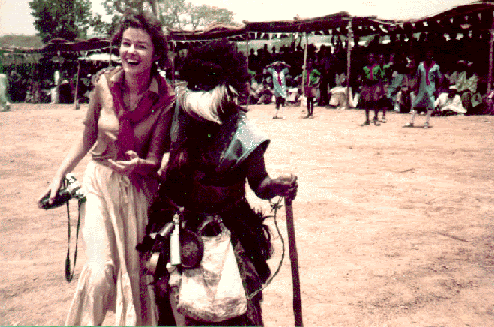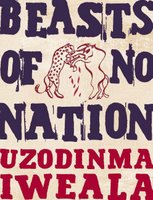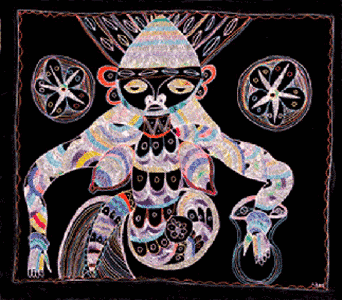We are given a house on the school compound, Gulshan and I. It is rectangular concrete box, one of three on this side of the school compound.
Inside the walls are painted dark blue, and the windows are high up on the walls, so that you cannot see out of them unless you stand on a chair. The lounge has sliding glass doors, which lead out onto the porch.
There is little furniture in the lounge. The dining table had been taken from the students’ dining hall. The dining chairs have been borrowed from the staff room. There is a lounge set, though some of the rubber strips that hold the foam cushions in place are missing, and so you must balance yourself carefully, so as not to fall through. There is a cupboard without doors, which is where I keep the few possessions I have brought with me, my camera, my recorder, a radio-cassette with the tapes I hastily recorded before I left and a few I bought on the street in Jos, and some items of makeup. I’ve also acquired an object that looks like a clay jug without a spout: it is in fact a drum, which you slap with the palms. The concrete floor is bare but for a straw mat I bought in the market. I don’t mop it often, I haven’t the energy, and it feels gritty. When the Harmattan comes howling round the houses, it doesn’t matter how often you sweep and wipe the furniture: there is always a layer of red dust on everything.
The kitchen has a stove and a refrigerator. The electricity only comes on for a few hours at night when the school generator comes on and so the refrigerator is useless for keeping more than bottles of water cold. I have a wonderful clay pot, which is so much more effective than the refrigerator. I keep it outside my backdoor, buried up to the lip in sand. The water is ice cold, even at the hottest part of the day.
Water is the great problem here. Outside the back door, there is a large zinc tank, which is filled once a week when the school tanker drives to Lafia, 60 km away. Sometimes, if I have water delivered to my tank, the girls come at night with their buckets and steal it.
But often the school tanker breaks down and we have to ask the students to bring us water. They carry it on their heads three kilometers from the river. I boil the water assiduously for ten minutes to kill all the bacteria, as we were told to do on our VSO training course, and pour it into the stainless steel water filter. The water trickles through the central core of limestone leaving the sediment behind.
The storeroom is almost empty. A few yam tubers that I shall later cut up and fry, and eat with sardines and onions. Rice, which we shall have to pick through to remove the stones. Dried beans and macaroni already infested with weevils, though this no longer bothers us. Perhaps a few cans of mackerel for the cat, and a couple of tins of baked beans, which we are saving up for a special treat for ourselves. We have to keep our papaya shut away in the store too; the cat is crazy for it. Perhaps that was one food that was easily available to him in the bush when he was a kitten?
We each have a bedroom. I sleep under a mosquito net, which always smells of dust. I spray insecticide under it, but still sometimes a mosquito gets trapped inside it and buzzes and bites the whole night long.
It is unbearably hot at night, without a fan even to keep us cool. I usually wake up in the small hours of the morning, bathed in sweat and go to the bathroom to throw cold water over myself so I can get back to sleep.
I have a big Hausa wedding basket in the corner of the room where for now I keep my dirty washing, but I shall take it home with me when the time comes. There are also a few novels by the side of my bed: some books in the Heinemann African Writers series that I managed to find in the bookshop in Jos, and then there are thrillers that I’ve borrowed in desperation from my Zairian neighbour, Kayembe, who is in love with Gulshan.
Gulshan’s room is next to mine. Her bed is covered in a brightly patterned Indian sheet, which came from her mother’s shop in Hastings. Why does the cat prefer to sleep, stretched out on her bed, when it’s me that feeds him?
The bathroom has a shower that cannot be used. The water tanker, even if it has water, cannot pump it up to the top tank that would provide each of the houses with piped water.
Instead, we carry all our water for bathing in buckets. I have a huge enamel basin, big enough to sit in, so that sometimes I can warm a pan of water on the stove and luxuriate in the nearest thing to a proper bath I can find.
We have a western style toilet. Because we do not have piped water, each time we want to flush it, we must pour water into the cistern. We use the water from washing clothes and washing ourselves, and sometimes I have to ask my students to let me have their dirty water from bathing.
The house faces the hostel, and the movements of the students set the pace for our days. In the morning the clank of buckets wakes us, as they make their way to the zinc sheds that serve as bathrooms. We know when to leave the house in the morning, when we see them parading off to school in their blue uniforms. In the long, hot afternoons the girls sit on upturned buckets for hours plaiting and binding each other’s hair into elaborate styles and gossiping. The vultures hop around them, ungainly and ridiculous on the ground.
Later, the girls go for sports practice, or clear the weeds and grass from the compound to keep away the snakes. Sometimes the girls come and sit on the porch with me and ask about England or trade songs with me.
There is a smoke-blacked hole in the asbestos board on the underside of the zinc roof. There was hive of bees inside my roof. I liked them because I could close my eyes and imagine myself back in an English country garden. But everyone said that they were dangerous and had to be got rid of. The Bible Studies master, the same man who had helped me to buy my water pot, offered to smoke them out. Gulshie and I acquiesced sadly, and went off to the school to supervise night prep when he came round to do the deed. When we came home, we learned that he had indeed smoked the bees, but had also taken the honey to sell in the town. We had been left with the hole in the roof, and all the bees, which had swarmed into our lounge. Now the space under the roof has become the home of a barn own, whose talons I hear scratching the ceiling of my bedroom.
I watch the comings and going to the matron’s house next door. She has a small shop where she sells soft drinks in bottles, sweets and biscuits. Sometimes she is prepared to sell one of her chickens: a particularly noisy rooster that crowed under my window at four a.m. tastes especially sweet. The matron also seems to act a marriage broker, and young men come up from the town to ask her to mediate between themselves and the schoolgirl they’ve chosen. Our principal doesn’t know this.
Beyond the wire mesh fence where our clothes are drying, you can see the bush for miles around. Fulani herdsmen graze their white zebu cattle on the dry savannah and white egrets settle on the cows like a flight of stars.
My home at the end of the world: a good place to heal myself.

With Kunga - official clown to the town ruler
 The John Llewellyn Rhys award for debut writers was won by Uzodinma Iweala's for his Beasts of No Nation, described by Michelle Pauli in the Guardian as:
The John Llewellyn Rhys award for debut writers was won by Uzodinma Iweala's for his Beasts of No Nation, described by Michelle Pauli in the Guardian as: Nigerian born Iweala is just 23. He grew up in the US and studied at Harvard where his novel grew out of the thesis he was writing. His mum Ngozi Okonjo-Iweala is Nigeria's finance minister (and hailed as "a great reformer").
Nigerian born Iweala is just 23. He grew up in the US and studied at Harvard where his novel grew out of the thesis he was writing. His mum Ngozi Okonjo-Iweala is Nigeria's finance minister (and hailed as "a great reformer").






